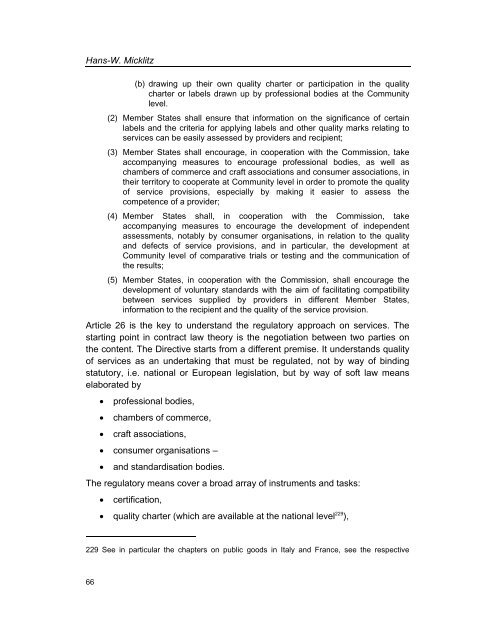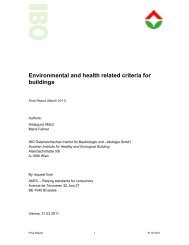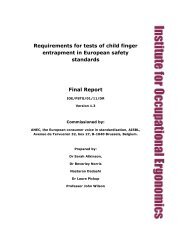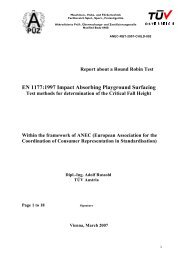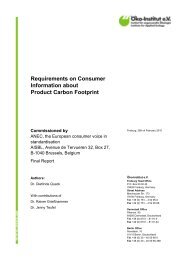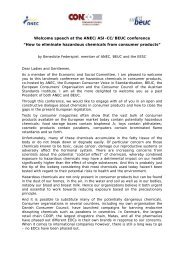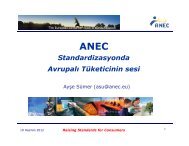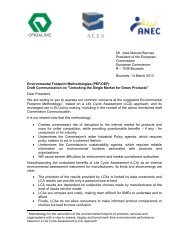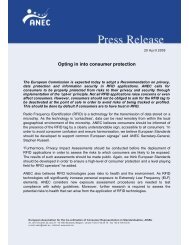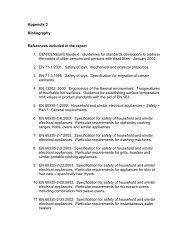Services Standards: Defining the Core Consumer Elements ... - ANEC
Services Standards: Defining the Core Consumer Elements ... - ANEC
Services Standards: Defining the Core Consumer Elements ... - ANEC
You also want an ePaper? Increase the reach of your titles
YUMPU automatically turns print PDFs into web optimized ePapers that Google loves.
Hans-W. Micklitz<br />
(b) drawing up <strong>the</strong>ir own quality charter or participation in <strong>the</strong> quality<br />
charter or labels drawn up by professional bodies at <strong>the</strong> Community<br />
level.<br />
(2) Member States shall ensure that information on <strong>the</strong> significance of certain<br />
labels and <strong>the</strong> criteria for applying labels and o<strong>the</strong>r quality marks relating to<br />
services can be easily assessed by providers and recipient;<br />
(3) Member States shall encourage, in cooperation with <strong>the</strong> Commission, take<br />
accompanying measures to encourage professional bodies, as well as<br />
chambers of commerce and craft associations and consumer associations, in<br />
<strong>the</strong>ir territory to cooperate at Community level in order to promote <strong>the</strong> quality<br />
of service provisions, especially by making it easier to assess <strong>the</strong><br />
competence of a provider;<br />
(4) Member States shall, in cooperation with <strong>the</strong> Commission, take<br />
accompanying measures to encourage <strong>the</strong> development of independent<br />
assessments, notably by consumer organisations, in relation to <strong>the</strong> quality<br />
and defects of service provisions, and in particular, <strong>the</strong> development at<br />
Community level of comparative trials or testing and <strong>the</strong> communication of<br />
<strong>the</strong> results;<br />
(5) Member States, in cooperation with <strong>the</strong> Commission, shall encourage <strong>the</strong><br />
development of voluntary standards with <strong>the</strong> aim of facilitating compatibility<br />
between services supplied by providers in different Member States,<br />
information to <strong>the</strong> recipient and <strong>the</strong> quality of <strong>the</strong> service provision.<br />
Article 26 is <strong>the</strong> key to understand <strong>the</strong> regulatory approach on services. The<br />
starting point in contract law <strong>the</strong>ory is <strong>the</strong> negotiation between two parties on<br />
<strong>the</strong> content. The Directive starts from a different premise. It understands quality<br />
of services as an undertaking that must be regulated, not by way of binding<br />
statutory, i.e. national or European legislation, but by way of soft law means<br />
elaborated by<br />
• professional bodies,<br />
• chambers of commerce,<br />
• craft associations,<br />
• consumer organisations –<br />
• and standardisation bodies.<br />
The regulatory means cover a broad array of instruments and tasks:<br />
• certification,<br />
• quality charter (which are available at <strong>the</strong> national level 229 ),<br />
229 See in particular <strong>the</strong> chapters on public goods in Italy and France, see <strong>the</strong> respective<br />
66


